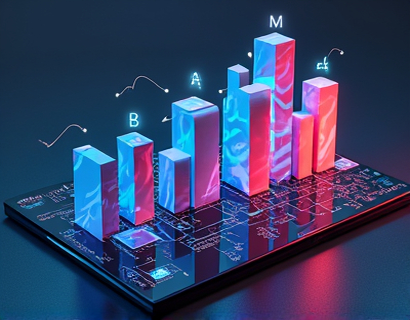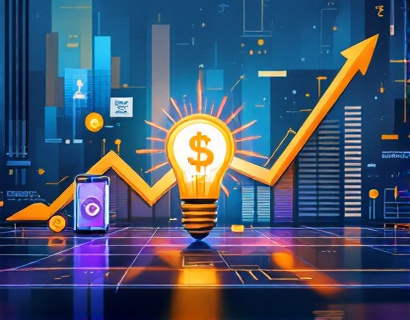Maximizing Strategic Growth: Advanced Technology Integration in Global Capital Markets Analysis
The landscape of global capital markets is undergoing a transformative shift, driven by the rapid integration of advanced technologies. For financial analysts and strategic decision-makers, staying ahead in this evolving environment requires a deep understanding of how technology can be leveraged to gain a competitive edge. This article delves into the critical role of technology integration in maximizing strategic growth within global capital markets, offering insights that are essential for navigating and thriving in the modern financial landscape.
The integration of advanced technologies such as artificial intelligence, machine learning, big data analytics, and blockchain is revolutionizing the way capital markets operate. These technologies are not just enhancing efficiency and accuracy but are also opening up new avenues for innovation and growth. Financial institutions that embrace these technological advancements can significantly improve their decision-making processes, risk management, and overall performance.
Enhancing Decision-Making with Advanced Analytics
One of the most impactful ways technology is transforming global capital markets is through the use of advanced analytics. Traditional methods of data analysis are being replaced by sophisticated algorithms and machine learning models that can process vast amounts of data in real-time. This shift enables financial analysts to uncover hidden patterns, predict market trends, and make more informed decisions.
For instance, predictive analytics powered by machine learning can forecast market movements with higher accuracy than conventional methods. By analyzing historical data and identifying correlations, these models can provide actionable insights that help investors and analysts anticipate market changes. This proactive approach to decision-making can lead to better investment strategies and increased portfolio performance.
Risk Management and Compliance
Risk management is a critical aspect of operating in global capital markets, and technology plays a pivotal role in enhancing this process. Advanced risk management systems leverage big data and AI to monitor and assess risks in real-time. These systems can detect anomalies, identify potential threats, and provide recommendations to mitigate risks effectively.
Moreover, the integration of blockchain technology is revolutionizing compliance and transparency in financial transactions. Blockchain's immutable and decentralized nature ensures that transactions are secure, traceable, and tamper-proof. This not only reduces the risk of fraud but also simplifies regulatory compliance, allowing financial institutions to operate more efficiently and with greater trust.
Operational Efficiency and Cost Reduction
The adoption of advanced technologies is not only about enhancing decision-making and risk management; it is also crucial for improving operational efficiency and reducing costs. Automation and robotic process automation (RPA) are transforming back-office operations by automating repetitive and time-consuming tasks. This allows financial institutions to allocate resources more effectively, reduce operational errors, and lower costs.
For example, RPA can automate tasks such as data entry, reconciliation, and report generation, freeing up human resources to focus on more strategic activities. Additionally, cloud computing enables scalable and flexible IT infrastructure, reducing the need for expensive hardware and maintenance. This shift to cloud-based solutions not only cuts costs but also enhances accessibility and collaboration across teams.
Client Experience and Personalization
The integration of technology is also transforming the client experience in global capital markets. Financial institutions are leveraging data analytics and AI to gain deeper insights into client preferences and behaviors. This information is used to offer personalized financial products and services, enhancing customer satisfaction and loyalty.
Digital platforms and mobile applications are making it easier for clients to manage their investments and access financial advice anytime, anywhere. These platforms often include features such as real-time portfolio tracking, customizable alerts, and interactive tools that provide clients with a more engaging and informative experience. By focusing on client-centric solutions, financial institutions can differentiate themselves in a competitive market.
Innovative Trading and Execution Strategies
Technology is also revolutionizing trading and execution strategies in global capital markets. High-frequency trading (HFT) and algorithmic trading are becoming increasingly prevalent, allowing firms to execute trades at speeds and volumes that were previously unimaginable. These strategies rely on advanced algorithms and low-latency networks to capitalize on market opportunities in milliseconds.
HFT, in particular, has transformed the trading landscape by enabling firms to execute large volumes of trades with minimal market impact. This not only improves liquidity but also provides a competitive advantage in terms of execution costs and timing. Algorithmic trading, on the other hand, uses predefined rules and models to make trading decisions, reducing the emotional bias and enhancing consistency in trade execution.
Cybersecurity and Data Protection
As financial institutions increasingly rely on technology, cybersecurity becomes a paramount concern. The integration of advanced technologies brings new vulnerabilities that must be addressed to protect sensitive financial data and maintain client trust. Robust cybersecurity measures, including encryption, multi-factor authentication, and continuous monitoring, are essential to safeguard against cyber threats.
Moreover, compliance with regulatory standards such as the General Data Protection Regulation (GDPR) and the New York Department of Financial Services' cybersecurity requirements is crucial. Financial institutions must invest in comprehensive cybersecurity frameworks to ensure data integrity and protect against potential breaches. This proactive approach to cybersecurity not only mitigates risks but also enhances the institution's reputation and credibility.
Future Trends and Opportunities
The integration of advanced technologies in global capital markets is a continuous process, with new trends and opportunities emerging regularly. One such trend is the rise of sustainable finance, where technology is playing a key role in promoting environmentally friendly and socially responsible investments. ESG (Environmental, Social, and Governance) data analytics tools help investors assess and manage the sustainability risks and opportunities associated with their portfolios.
Another exciting development is the use of decentralized finance (DeFi) platforms, which leverage blockchain technology to create open, transparent, and accessible financial systems. DeFi applications offer innovative solutions such as decentralized lending, borrowing, and trading, disrupting traditional financial intermediaries and providing new opportunities for investors and borrowers alike.
As the financial industry continues to evolve, the integration of advanced technologies will remain a critical factor in driving strategic growth. Financial institutions that embrace these technological advancements and integrate them effectively into their operations will be better positioned to navigate the complexities of the global capital markets and achieve long-term success.










































